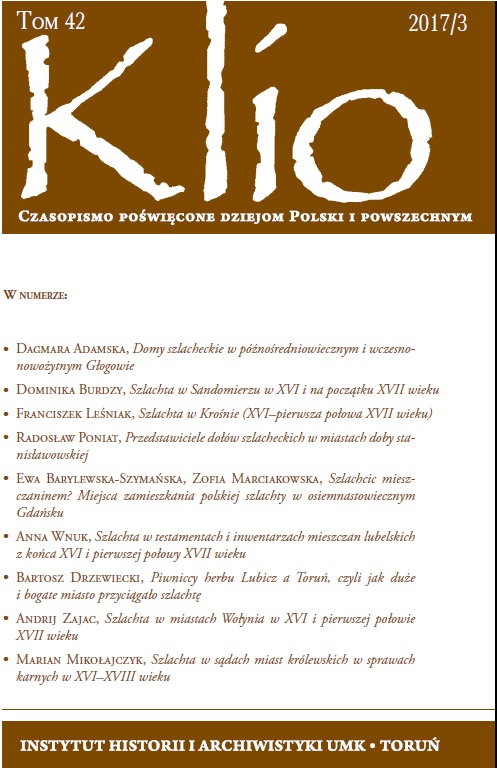Szlachta UJ testamentach i imuentarzach mieszczan lubelskich z końca XVI i pierinszej połomy XVII inieku
Nobility in testaments and inventories of Lublin citizens from the end of 16th and the first half of 17th centuries
Author(s): Anna WnukSubject(s): Local History / Microhistory, 16th Century, 17th Century
Published by: Wydawnictwo Naukowe Uniwersytetu Mikołaja Kopernika
Keywords: Lublin; noble landowners; mentality; burghers; testaments and inventories; material culture in the early modern period;
Summary/Abstract: The article tells about nobility’s participation in Lublin life. There are a lot of testaments and inventories, where we can find some information showing a positive corre¬lation between the representatives of both estates (nobility and burghers). The relationship was based on financial, personal, economic and professional interests. Crown Tribunal had been in existence since 1578 in Małopolska Province that resulted the appearance of noble landowners there. Lublin was the place to deal with official mat¬ters on voivodeship and regional levels because of regional assemblies functioning. Land and municipal courts were also held there. Noble landowners came here from their mansions and often spent weeks to arrange dif¬ferent things. Lublin was also the main trading centre and the biggest agricultural market in the region. The crowds of noble landowners were too burdensome for the town because of the fact, that town hall was too busy during the tribunal sessions and besides that they rented burgers’ premises a lot. On the other hand it had been influenced the development of the city and activating the crafting creativity. The burgers took care of newcomers in case of illness or death (fu¬neral) or provided them with food. There was close relationship between noble landown¬ers and Lublin patriciate. The representatives of both estates (nobility and burghers) showed a marked adherence to new religious trends during the Reformation, that was the factor which made the rela¬tionship closer between them. The existence of noble landowners in the town contributed to better relations with the local society-the nobles hosted burgers’ sons, helped them with education and professional carries. In the town the noble landowners were looking for high recyclable products demand¬ing high quality skills, which their employed servants didn’t posses. They often used high- qualified men good with their hands. In 16th century within the walls and town outskirts more and more noble manor houses were built. The burghers’ testaments and inventories show that the noble influence on town life was very high during that period. In 17th cen¬tury, the character of Lublin society had changed and the situation with noble and state reflected burghers position.
Journal: Klio. Czasopismo poświęcone dziejom Polski i powszechnym
- Issue Year: 42/2017
- Issue No: 3
- Page Range: 129-157
- Page Count: 29
- Language: Polish

